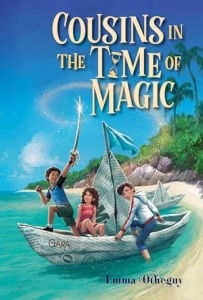Cousins in the Time of Magic
Emma Otheguy
Aladdin
Published February 25, 2025
Amazon | Bookshop | Goodreads
About Cousins in the Time of Magic
Three cousins get transported back to 1862 to play an important role in the Battle of Puebla, the reason we celebrate Cinco de Mayo today, in this enchanting middle grade fantasy adventure.
History is alive with magic. That’s what zany Tía Xia is always telling cousins Jorge, Camila, and Siggy. Daredevil Jorge couldn’t be more different than his cousins: Camila is a dreamer who adores animals and Siggy is an aspiring influencer who has an exclusive party to attend. And their aunt has many secrets, including a mysterious diamond-encrusted sword that Jorge definitely wasn’t supposed to see.
But when the three stumble upon a time portal in their aunt’s yard, they are transported back to 1862, a past filled with wonders—and dangers. To return to the present, they must race to deliver the sword to General Ignacio Zaragoza in time for the historic Battle of Puebla in Mexico: the foundation of the holiday Cinco de Mayo.
As their journey to Mexico takes them through the Civil War–era United States, the cousins see just how much US history has been shaped by Latine communities. They must find the power within themselves to make sure things happen as they’re supposed to, without altering the past.
My Review
This is a fun, engaging way to introduce facts from Mexican history to young readers via cousins on a time-travel adventure. (Actually, I think two characters are brother and sister and cousin to the third character.)
I liked that the time-travel element was pretty simple, even if it was never really explained. It could have slowed the story down, but keeping it minimized worked here, I think. The characters were fun, and their differences made it easy to tell whose point of view we were following. The viewpoint shifts mid-scene, so sometimes one chapter has multiple points of view, but I thought it was still easy to follow.
One thing that I appreciated is the backmatter. First, a note from the author explains her intent. Next, a list of notes about characters and places shows readers the line between history and fiction. A glossary explains some other terms used in the book. Even with those resources, the book is about 200 pages long, so it’s a pretty quick read.
The ending leaves room for a sequel or series. I would love to see more books exploring Mexican or Latin American history through time travel.
Content Notes
Recommended for Ages 8 to 12.
Profanity/Crude Language Content
None.
Romance/Sexual Content
None.
Spiritual Content
Characters encounter magic and travel through time. One character believes Mexico should be governed by a monarch who will impose Catholicism on everyone.
Violent Content
A bully dares a boy to do a handstand on a rooftop.
Drug Content
References to an adult drinking alcohol and beginning to slur his words.
Note: This post contains affiliate links, which do not cost you anything to use but help support this blog. I received a free copy of this book in exchange for my honest review. All opinions are my own.
Marvelous Middle-Grade Monday
I’m sharing this post as a part of a weekly round-up of middle-grade posts called Marvelous Middle-Grade Monday. Check out other blogs with posts about middle-grade books today on Marvelous Middle-Grade Mondays at Always in the Middle with Greg Pattridge.
